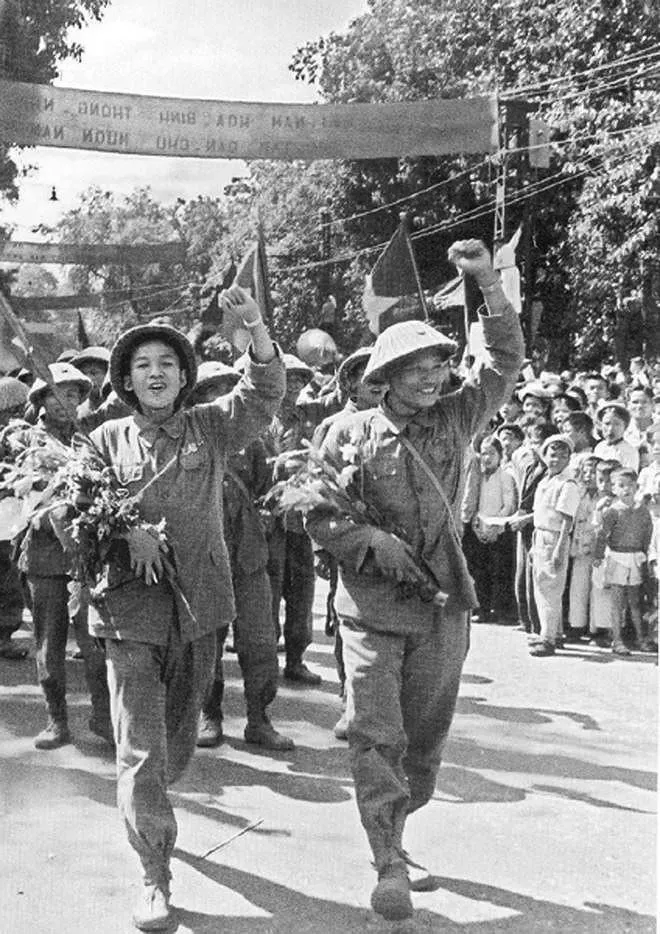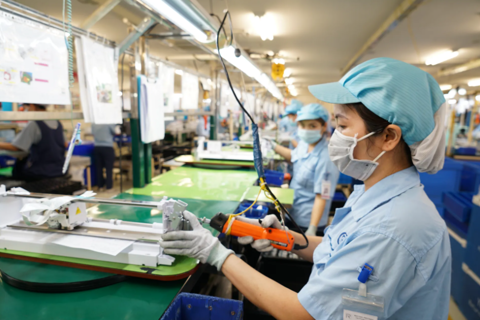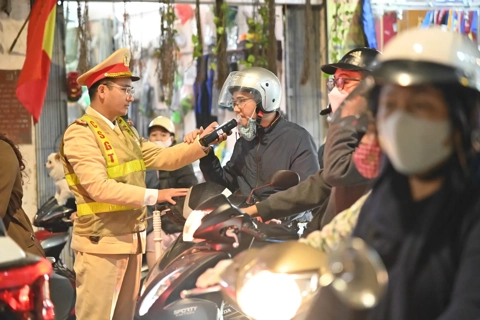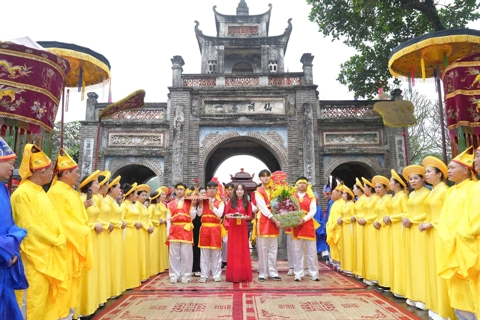Hanoi celebrates liberation day in jubilation
The Party expedited the capture of Hanoi to protect against the French colonialists' plan to exploit the transition to undermine the cultural and economic infrastructure.
After nine years of fighting French colonialism (1946-1954), Vietnam emerged victorious under the leadership of the Party. After the signing of the Geneva Accords on July 21, 1954, all French troops had to leave Indochina.
Hanoi remained under French military occupation for 80 days. To prevent the French colonialists from using this time to sabotage economic and cultural facilities, the Party expedited the takeover of Hanoi.
Preparing for the historic march
On September 17, 1954, the Hanoi Military and Political Committee was established to take over and administer the city.
The handover had to be carried out in an orderly and safe manner, without causing any destruction or disruption to the life of the city. At 4 PM on October 9, 1954, the last French soldiers left Hanoi via the Long Bien Bridge.
Colonel Duong Niet, born in 1934, was one of more than 200 soldiers selected to be among the first group to enter the city.
They arrived in Hanoi on October 7, 1954, and went straight to the headquarters of the Joint Armistice Committee at the Don Thuy Hospital (now the 108 Central Military Hospital).
| Colonel Duong Niet was one of the first soldiers to enter the capital in 1954. Photo: Ngo Minh/The Hanoi Times |
Duong Niet said that the task of the advance troops was to prevent the destruction of French infrastructure in the city center, to deter them from inciting people to migrate to the south, to prepare everything to receive the army to take over the capital, and to maintain security and order in the city.
"The French were unwilling to hand over anything to the revolutionary government because they were still angry after losing the battle of Dien Bien Phu. However, their plan to sabotage Hanoi was completely thwarted before the revolutionary government took control. We went in first to carry out the task of fighting this sabotage," Colonel Duong Niet explained.
Along with the troops, a select group of many young intellectuals from the war zone were sent to Hanoi to prepare for the takeover.
| The victorious army enters Hanoi to the warm welcome of the people. File Photo |
Nguyen Van Khang, born in 1935, said that from October 3 to 6, 1954, the young men were on a pre-emptive mission to contact the people of Hanoi before the army moved in to take over.
"We dismantled the enemy's reactionary and inciting slogans and explained our government's policies to the populace. We met people every day and explained to them that the government would maintain life as before. Their businesses would continue as usual. Our persistent explanations reassured the people at that time," Khang said.
Thanks to her knowledge of French, Le Thi Tuy (born in 1936) was chosen to join the army to take over the French institutions.
With joy and pride, Tuy and her friends went from house to house explaining the takeover and mobilizing people to build gates to welcome the army to the capital.
"Everyone responded enthusiastically and made use of available materials to build welcome gates. Hang Dao Street has a welcome gate made of colorful silk. Hang Non Street has a welcome gate made of different kinds of hats. People even secretly went to the outskirts of the city to bring back bundles of coconut leaves to make the gates more beautiful to welcome the victorious army," Tuy said emotionally.
Bursting with joy of victory
Early in the morning of October 10, 1954, the loudspeaker announced: "Attention people, this morning our troops will arrive to take over the city."
Soldier Nguyen Tien Ha, a member of the Hoang Dieu National Salvation Youth Union, and his unit were stationed in Thanh Tri District. He stayed awake all night on October 9, waiting for the time to march into Hanoi.
In front of Nguyen Tien Ha's eyes, brightly colored flags and flowers greeted the victorious army.
People dressed in their best clothes, carrying flags, flowers, and banners that had been prepared, crowded both sides of the road to greet the troops entering through the city gates. Everyone shouted slogans: "Long live President Ho Chi Minh," "Long live the troops returning to take over the capital."
| The atmosphere of October 10, 1954 is recreated in Hanoi's Old Quarter. Photo: Phuong Anh/The Hanoi Times |
“The people ran out to hug the liberation soldiers, all joined in the common joy,” Ha recalled with tears in his eyes.
At exactly 3 PM, the siren on the roof of the Hanoi Opera House sounded a long blast. Hundreds of thousands of people in the capital attended the solemn flag-raising ceremony at the Hanoi Flag Tower.
Colonel Duong Niet said that the historic event of liberating the capital had left many valuable lessons, such as clearly defining the role of the capital in the resistance process, making good preparations in all aspects, waiting for the right time, carrying out the successful takeover, and completing the cause of liberating the capital.
"As we made our way back to the capital, it was obvious that the people's thirst for freedom and peace was exploding with boundless enthusiasm. 70 years have passed, and every time the anniversary of October 10 comes, I feel as if I am reliving those heroic years. I hope that the echo of the heroic song of Hanoi's struggle and victory will always resonate with all generations, especially the younger generations so that they can carry on the proud tradition of their ancestors and build a civilized, rich, beautiful, and modern capital," Colonel Duong Niet said.




.png)










